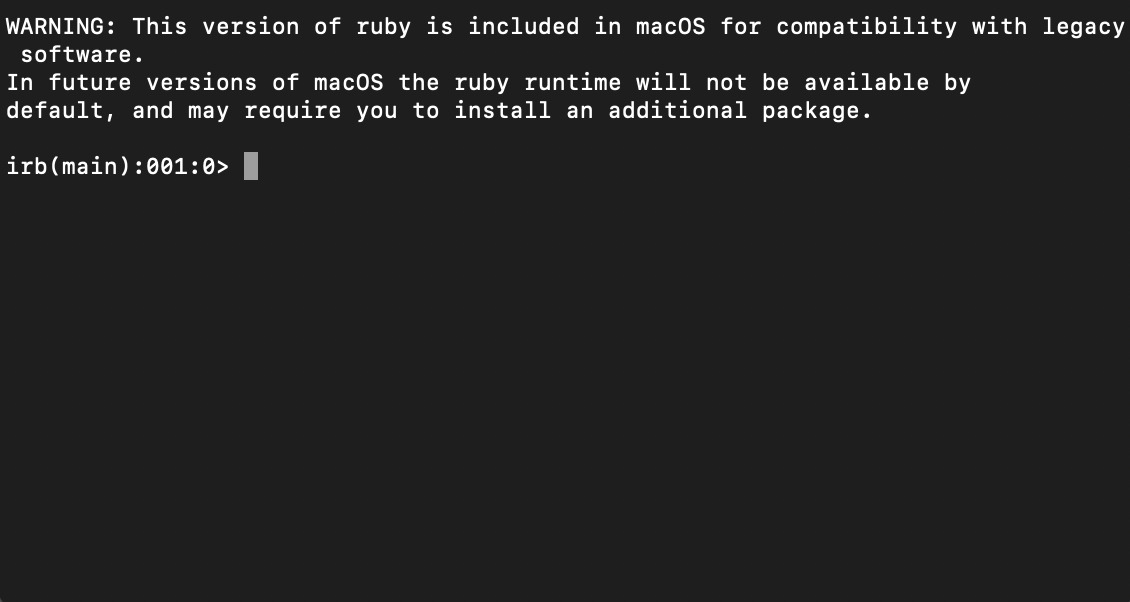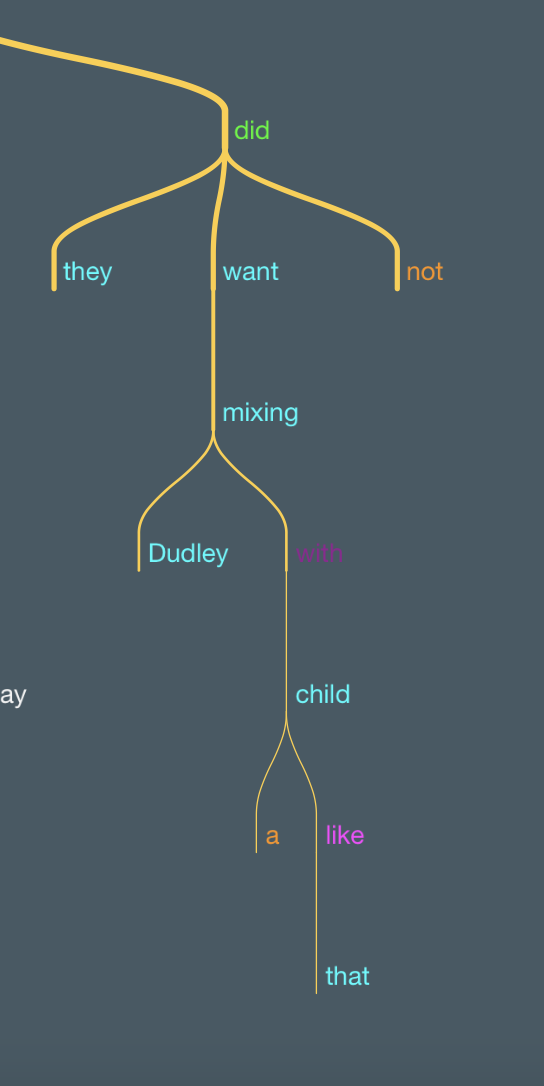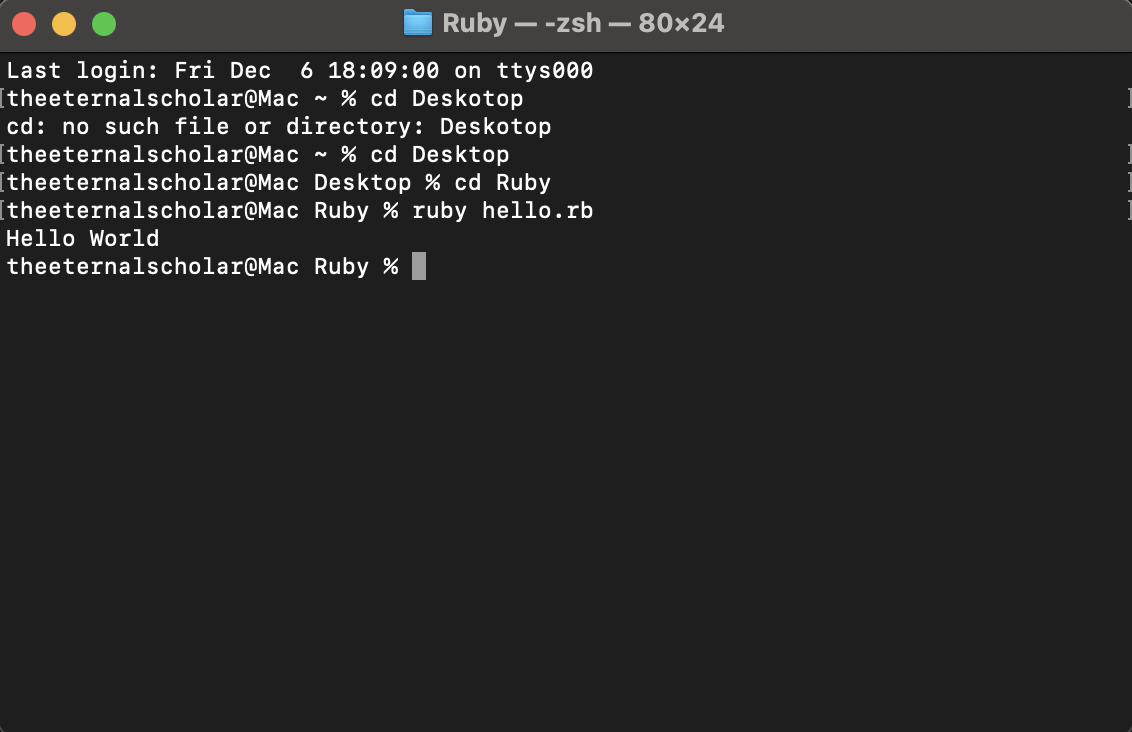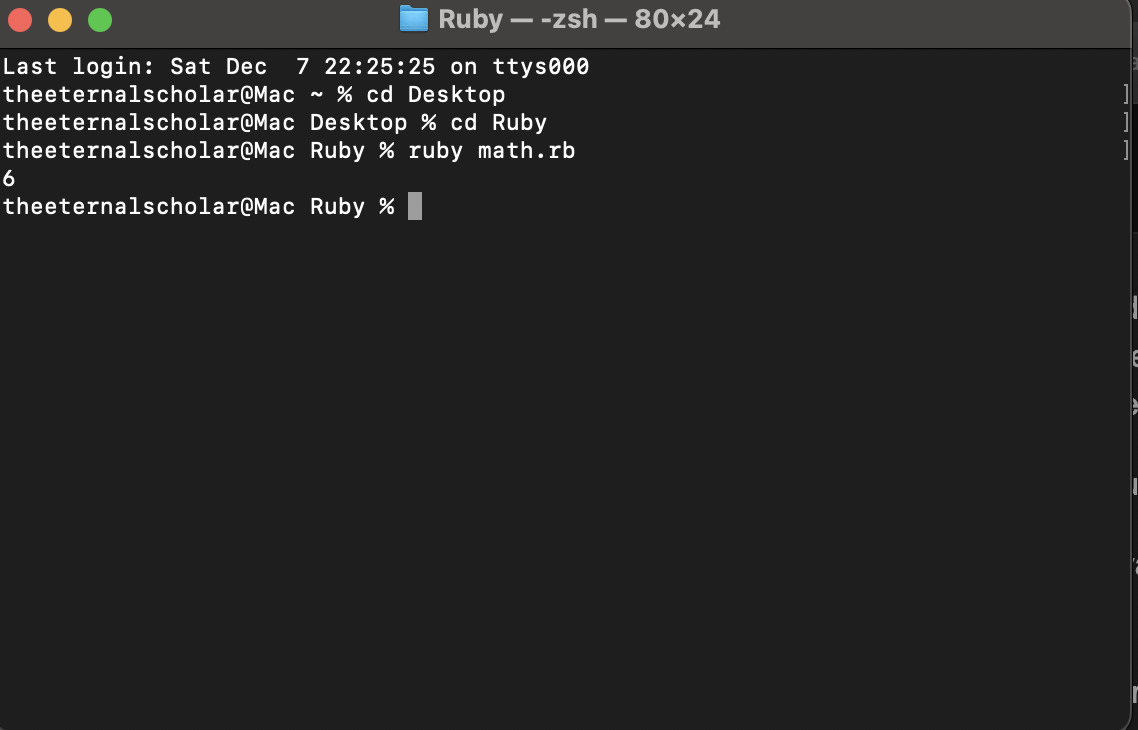What’s the thing they didn’t want, as one word?
Hmm. I tree’d it in a way so that it says they didn’t want Dudley and then proceeded to have it modified by mixing. The thing they didn’t want was Dudley mixing with a child like that. So the thing they didn’t want, as one word, was “mixing”?
yes. mixing makes more sense as the object. so can you figure out a tree that way?
It is. It worked:
I will work on the rest of this assignment soon.
Hmm. Prepositions need a prepositional object, right? Prepositions also relate something to the prepositional object. I’m not sure. I spent around ~5 minutes thinking about and I don’t know. Is it fine to look stuff up? Do you want me to work on it longer? I looked up “in” in the dictionary and I think its adverb definition makes sense for the sentence you gave:
From Merriam-Webster:
within a particular place
Using that definition I tree’d it like this:
I don’t know what third does. Some guesses: interjection or it modifies create.
We worked on word problems. I think I remember the method you had me do. Hmm. No I don’t. Wack. Roughly it was something like: solve the equation/do the math last, step 1 read the problem and assign variables and stuff, i forgot step 2. Hmm. Ok I forgot that.
We worked on number line stuff. How multiplication makes it bigger, division smaller, addition moves it over, etc. I used that to map certain inputs to outputs. We did that in the context of having logical operators as math. Off the top of my head I forgot exactly how I did that, but I think I could figure it quickly.
Thats it I think? I do remember when we first started touching math topics you verified if I knew certain things. I forgot what those were. The above two are the only examples of math I remember us going over.
Yeah, I don’t actually think it could be anything other than an infinitive either. But I remember it being a little hard for me to see/understand infinitives without the ‘to’ marker as infinitives early on.
Reading over your post again, I can see that you weren’t necessarily unsure about whether ‘flutter’ was an infinitive, but about what ‘flutter past the window’ modified. I think I took what you said here as meaning that treating ‘flutter’ as an infinitive seemed weird to you:
But I can see that perhaps you meant it’s the fact that it’s an infinitive modifying owl that’s seems weird to you.
Yeah the first one. I agree that ‘flutter’ is an infinitive and I was offering you another tool to help figure that out if you were unsure. I’ve also found that tool useful in many other situations and not just with infinitives.
Review the older math and logic posts some and see if it all seems reasonably clear to you or if you have some questions/confusions or see things you think you could use more practice for. Check if you forgot how to do some things.
So about:
None of them noticed a large, tawny owl flutter past the window.
For this kind of sentence, you should be considering if the non-finite verb is an object or modifier. It’s important to consider both possibilities and come up with a reason for your conclusion.
The core sentence format here is:
subject verbed noun non-finite-verb.
E.g.
They noticed owls flutter.
They saw dogs eat.
They saw dogs eating.
(I pluralized the nouns just to avoid adding an extra inessential word like “the”.)
Do you see how these simplified versions, including the one about different subject matter, are the same type of sentence as the original?
For “eating”, that’s a gerund, not a participle, so “eating” not “dogs” has to be the object. A participle is like:
They saw running water.
They saw eating dogs. [awkward but I think understandable]
I think you both could probably benefit from looking through participle examples at Participle: Definition and Examples
Participles tend to go before the thing they modify. Note that you should consider if the thing after the participle may be the participle’s object rather than being modified by the participle. E.g. in “He was carrying bricks.”, “bricks” is an object of “carrying” not a noun being modified by “carrying”.
By contrast:
They saw water running.
Here “running” is not a participle nor an infinitive. It doesn’t fit any of the participle examples or use cases linked above. It must be a gerund. So it must be the object with “water” as its subject.
Put another way, the thing they saw is not plain water, it’s the group “water running”, and the head of that group is the (non-finite) verb “running”, not the simple noun.
Sometimes the non-finite verb is the object, not a modifier. I think there’s often some quite unintuitive about that, so it should be explicitly considered.
Infinitives like “flutter” tend to be trickier than differentiating present participles from gerunds.
For the fluttering owl sentence, I’m not sure if either of you gave much consideration to “flutter” potentially being an object not a modifier. So let me know if you already did consider and your conclusion and reasoning, or if not try considering it now.
Note that I haven’t found good, clear expert explanations of this topic. It’s my best understanding of the matter partly using my own judgment and research, not just looking up standard rules. Also if this is getting too much into details that you aren’t interested in, you can say that; I don’t think it’s necessary for most philosophy text analysis. It affects tree structure but part of why it’s tricky to reach conclusions about is it doesn’t have a big effect on meaning either way.
That’s fine if you don’t know. You can look stuff up if you want, or see if @LMD’s answer makes sense to you. LMD Async Tutoring - #754 by LMD
For “third”, it’s basically modifying the whole sentence. The sentence as a whole is third on a list. So have it modify the sentence root (which will be a finite verb or a conjunction joining finite verbs in general).
Quick update and some writing to share:
Update -
I had a cold this past week. I think it’s because it just started getting very cold where I live. Finally started to feel better. Along with that have a bunch of family issues related to an immigrating family member that, long-story short, my parents got tricked into having him stay at our house.
I’ll post some work tonight, but the past few days I just worked on some other non-philosophy related things. I worked on fixing up an exercise routine and a sleep routine. The workout routine has been going well (yes I did workout sick, probably not the best but my sickness wasn’t debilitating plus I’m fine now so idk) for the past week. I think I’ll be able to keep it up. Trying to get consistent sleep has been 75/25. For the past two weeks or so I’ve been going to sleep most days around the same time of 11 and waking up at 7. Quitting caffeine has really helped my sleep quality. I think the only way I could get a very consistent sleep schedule is working out some scheduling kinks with my job. Though thats going to take a while. I can get a better schedule, but the more restrictive my availability the less hours. I do need to work on some spending habits.
Writing -
I’m sharing two things today.
First, a catch 22 from work. A coworker of mine has been calling out sick quite often recently. Manager has a discussion with her over these call outs and tells her because she doesn’t have sick time she can get in trouble. Apparently (I say apparently because I can’t find the policy and I don’t trust anything managers say anymore) the policy is that you have to use one hour of sick time per hour you’re calling out sick for. So for a four hour shift you need four hours of sick time to call out sick. She points out she can’t work while sick. So she asked what she is supposed to do if she’s sick with no sick time. Come to work sick? My manager said no. I’ll write you up, What if I call out sick with no sick time. That’s also a write up. Wack.
Second, my managers husband has been a stay at home husband for quite a while from what I understand. He only recently (in the past two months) got a job at a different Starbucks. He works low hours as a regular barista. Today he brought in their five daughters because some of them needed to get their hair done in some manner (I know nothing about hair so I forgot what she told me when I asked why her kids were at work) for a dance thing. I just thought it was kinda weird he hasn’t bothered learning about this stuff when he’s a stay at home dad with all girls. Instead, he had to bring all the kids to work and my manager took her meal break to fix their hair. Reminded me of something you said in the Analyzing Relationship Drama Reddit Story thread:
I made a list of the math
I reviewed the old posts. I made a list of stuff that we went over:
- Arithmetic Trees
- Systems of Equations
- Multi-Factor Decision Making Math Article
- Number Line
- Word Problems
- Logic Operators
- Parentheses
- Logical Operators as Math
I’ll review if I forgot anything soon.
I’m too tired to read all this now but I wanted to say something quick so:
Look up “if” statements in ruby and try a few.
After that, you could look up looping, like make a program that prints out the numbers from 1 to 10 using a loop, not using 10 separate puts commands.
Then you could combine these: make a program that prints out odd numbers from 1 to 10.
Did not try a few. Just wanted to see if I could figure this out quickly or not. Will try more stuff tomorrow. However, got some stuff working.
I did it with a while loop. I read about it from this article: Ruby | Loops (for, while, do..while, until) - GeeksforGeeks
Just read about while loops. Didn’t fully understand everything said there.
Printing out the numbers from 1 to 10:
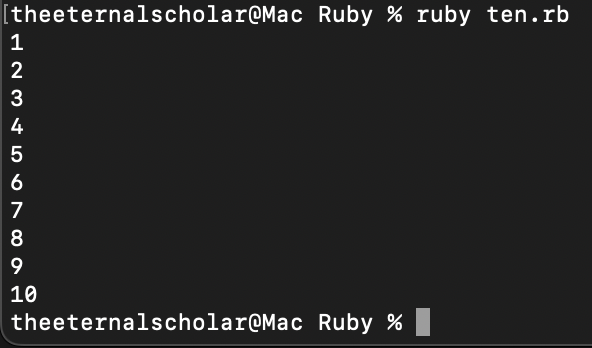
what i wrote:
x = 1
while x <=10
puts x
x = x + 1
end
Odd numbers:
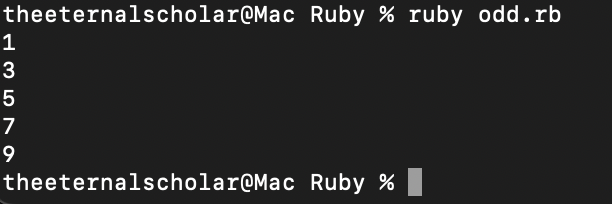
what i wrote:
x = 1
while x <=10
puts x
x = x + 2
end
Re-reading what you said, I think you wanted me to combine if statements with the loop do print out odd numbers. I’ll retry this later today.
great
Many workplaces are controlling. There are many stories of people getting in trouble for using their paid vacation days that they are offered as part of their contract when they’re hired. There are also stories about people being fired for taking one unpaid day or week off with plenty of advance notice.
In ruby you can define functions like this:
def f
return 5
end
Then call it like this:
f()
Functions can take inputs:
def g(x,y)
return x+3*y
end
Call it like
g(8,9)
Or
g 8, 9
Ruby is one of the more lenient programming languages regarding formatting. You can often leave out whitespace or put extra whitespace. More notably, you can often leave out parentheses. Ruby tries to figure out where the parentheses are, but sometimes that doesn’t work when it’s ambiguous. You’ve seen this before:
puts "hello world"
is a function call with the parentheses left out. It’s the same as:
puts("hello world")
Not everything is a function call. Some keywords have special meanings, like “def”, “if”, “return” and “while”.
Functions let you reuse chunks of code.
All of this is closely related to math.
Try defining and calling a function in irb.
a = 1
for a in 1..10 do
if a.modulo(2)==1
puts a
end
end

